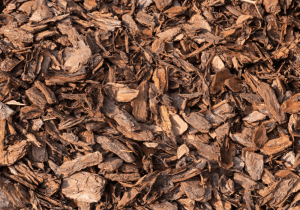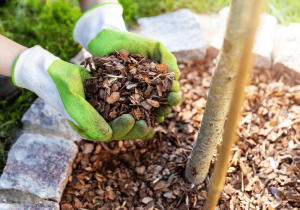Imagine a lush, vibrant garden where your trees are the stars of the show. Healthy, strong trees not only enhance your garden’s aesthetic appeal but also contribute significantly to the ecosystem. But how do you ensure your trees remain healthy? The answer lies in a practice as old as gardening itself—mulching.
Mulching involves covering the soil around your trees with a protective layer of material. While various materials can be used, organic mulch stands out for its myriad benefits. In this blog post, we will explore the wonders of organic mulch, its different types, and why it’s an essential tool for lush trees and gardens. By the end of this read, you’ll be equipped with the knowledge to transform your greenery and promote the health of your trees.
Exploring the Different Types of Organic Mulch
 Bark Mulch
Bark Mulch
One of the most popular choices, bark mulch, is derived from the outermost layers of trees. It decomposes slowly, making it an excellent long-term option. Bark mulch is available in various sizes, from finely shredded to large nuggets, each offering slightly different benefits.
Wood Chips
Wood chips are another fantastic option for mulching. Made from chipped branches and tree trunks, they decompose faster than bark mulch, enriching the soil more quickly. The coarse texture of wood chips also helps in preventing soil compaction.
Compost
Compost mulch is a nutrient-rich option that provides immediate benefits to the soil. Made from decomposed organic matter, compost improves soil structure, fertility, and moisture retention. It’s an excellent choice if you want to boost your garden’s overall health quickly.
Grass Clippings
If you’re looking for a practical and cost-effective mulch, grass clippings might be your best bet. They decompose rapidly, providing a quick nutrient boost to your soil. However, it’s important to use untreated grass to avoid introducing chemicals into your garden.
Leaf Mulch
Fallen leaves can be easily repurposed as mulch. They decompose and enrich the soil with essential nutrients. Leaf mulch also creates a natural habitat for beneficial insects, contributing to a healthier garden ecosystem.
Benefits of Organic Mulch
Soil Moisture Retention
One of the primary benefits of organic mulch is its ability to retain soil moisture. Mulch acts as a barrier, reducing water evaporation from the soil. This is particularly beneficial during hot summer months when water retention is crucial for tree health.
Weed Suppression
Weeds compete with your trees for nutrients and water. Organic mulch creates a physical barrier that prevents weed seeds from germinating. This reduces the need for chemical weed killers, making your garden more environmentally friendly.
Soil Temperature Moderation
Temperature fluctuations can stress your trees. Organic mulch helps moderate soil temperatures by insulating the ground. This means cooler soil in the summer and warmer soil in the winter, creating a stable environment for your trees’ roots.
Nutrient Enhancement
As organic mulch breaks down, it enriches the soil with essential nutrients. This natural composting process improves soil structure and fertility, promoting healthier tree growth. Your trees will thank you with lush foliage and robust health
Best Practices for Mulching Trees at Home
 Depth and Distribution
Depth and Distribution
When applying mulch, aim for a depth of 2-4 inches. Too much mulch can suffocate the roots, while too little may not provide adequate benefits. Spread the mulch evenly, making sure it extends to the tree’s drip line.
Distance from the Trunk
Avoid piling mulch directly against the trunk of the tree. This practice, known as “volcano mulching,” can lead to rot and pest infestations. Maintain a gap of about 6 inches between the trunk and the mulch to ensure proper air circulation.
Reapplication and Maintenance
Organic mulch will decompose over time, so it’s important to replenish it periodically. Check the mulch layer every few months and add more as needed to maintain the optimal depth. Regular maintenance ensures your trees continue to benefit from the mulch.
Environmental Benefits of Using Organic Mulch vs Synthetic Options
Sustainability
Organic mulch is a sustainable choice as it is biodegradable and made from natural materials. Unlike synthetic options, which can contribute to environmental pollution, organic mulch breaks down and enriches the soil.
Biodiversity Support
Using organic mulch fosters a diverse ecosystem in your garden. It provides a habitat for beneficial insects, fungi, and microorganisms that contribute to soil health. This biodiversity creates a balanced and thriving garden environment.
Reduction of Chemical Use
By suppressing weeds naturally and enriching the soil, organic mulch reduces the need for chemical fertilizers and herbicides. This leads to a healthier garden and minimizes the impact on the surrounding environment.
Incorporating organic mulch into your gardening routine offers numerous benefits for tree health and the overall garden ecosystem. From retaining soil moisture and suppressing weeds to enhancing soil nutrients and supporting biodiversity, organic mulch is a powerful tool for any greenery. In the end, the beauty of a well-mulched garden lies not just in its appearance but in the health and vitality it brings to your trees and plants.
